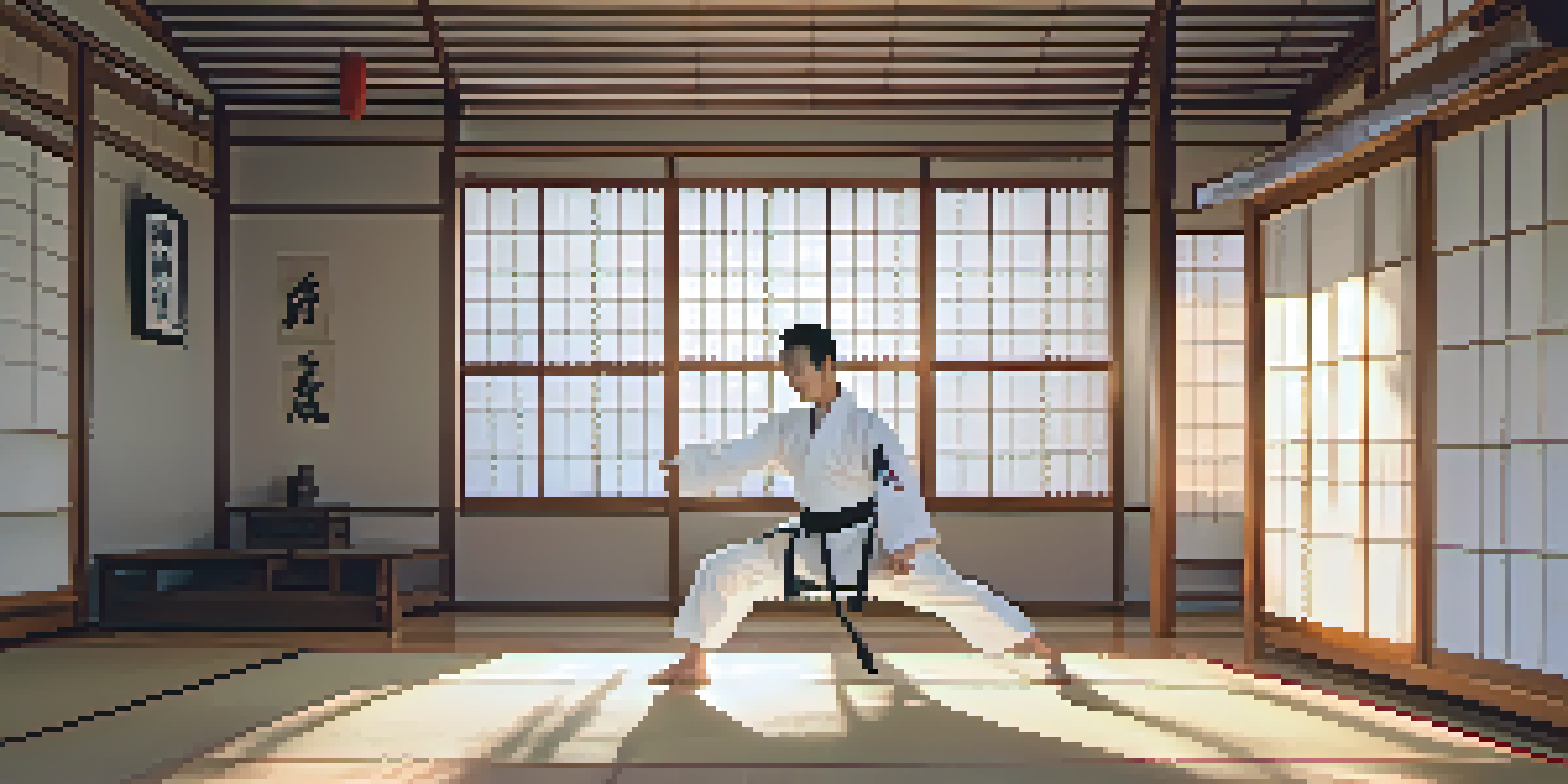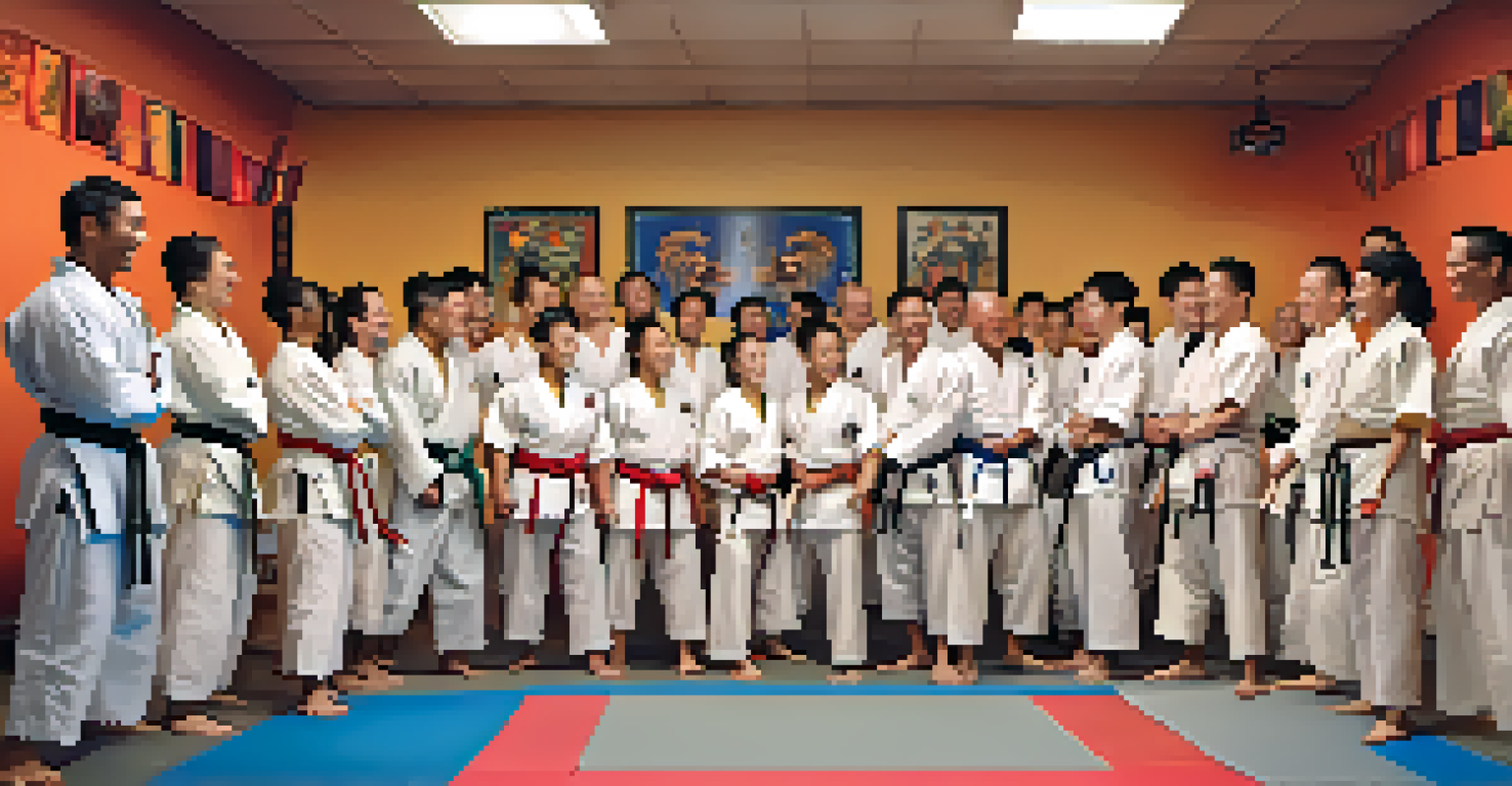Self-Defense Psychology: Insights from Martial Arts Training

The Connection Between Mind and Body in Self-Defense
Self-defense is not just about physical techniques; it’s deeply rooted in the mental aspects of an individual. When faced with a threatening situation, the body's response can be influenced significantly by mental preparedness. This connection highlights the importance of training, where martial arts go beyond mere physicality and delve into the psychological resilience needed in high-stress environments.
The mind is everything. What you think you become.
Martial arts training often encourages practitioners to develop a heightened awareness of their surroundings. This vigilance helps in identifying potential threats before they escalate. By learning to read situations better, individuals can make informed decisions, which is a critical aspect of self-defense psychology.
Moreover, understanding one’s own mental state during confrontations can lead to better outcomes. Techniques such as visualization and mindfulness, often integrated into martial arts training, can help practitioners maintain composure and focus. This mental clarity is essential when navigating the complexities of self-defense scenarios.
The Role of Fear in Self-Defense Situations
Fear is a natural response to danger, but it can either hinder or help in a self-defense situation. In martial arts training, practitioners learn to confront and manage their fears, transforming anxiety into a tool for survival. This shift in perspective can greatly enhance one's ability to respond effectively when faced with real threats.

For instance, sparring in a controlled environment allows martial artists to experience fear in a manageable way. They learn that feeling afraid doesn’t equate to being ineffective; rather, it can motivate them to act decisively. This understanding can be pivotal in real-life situations where fear might otherwise lead to paralysis.
Mind-Body Connection in Defense
Self-defense relies heavily on mental preparedness, as practitioners develop psychological resilience alongside physical techniques.
Additionally, the ability to channel fear into energy can enhance performance. In martial arts, practitioners often use techniques that allow them to harness adrenaline positively, improving their reaction times and decision-making skills. This psychological fortitude can make all the difference when it matters most.
Building Confidence Through Martial Arts Training
Confidence is a cornerstone of effective self-defense. Through consistent martial arts training, individuals can cultivate a sense of self-assurance that extends beyond the dojo. This newfound confidence can deter potential aggressors, as they often sense when someone is self-assured and less likely to be an easy target.
Your body can stand almost anything. It’s your mind that you have to convince.
As practitioners progress in their training, they accumulate skills and knowledge that reinforce their belief in their abilities. The sense of accomplishment from mastering techniques, whether it's a kick or a throw, contributes to a positive self-image. This psychological boost is invaluable in self-defense situations, where confidence can be the difference between success and failure.
Moreover, martial arts often emphasize the importance of respect and self-discipline. These values help individuals build a strong moral compass, which can guide their actions in precarious situations. A confident person is typically more likely to de-escalate conflicts rather than resort to violence, showcasing the profound impact of psychological training in martial arts.
Understanding Aggression and Its Management
Aggression can be both a threat and a tool in self-defense. In martial arts, practitioners learn to understand their own aggressive impulses and how to manage them effectively. This understanding allows them to respond to threats with calculated force rather than uncontrolled rage, which can have dangerous consequences.
Through various drills and sparring sessions, martial artists explore the nuances of aggression. They learn when it’s appropriate to defend themselves and when to walk away. This balanced approach fosters a deep understanding of aggression as a part of human nature, which is crucial for anyone wanting to master self-defense psychology.
Fear Management in Training
Martial arts training teaches individuals to confront and channel their fears, enhancing their ability to respond effectively to real threats.
Additionally, martial arts training often includes conflict resolution strategies. By learning how to communicate and negotiate effectively, practitioners are equipped with the skills necessary to diffuse situations before they escalate. This comprehensive understanding of aggression not only enhances self-defense capabilities but also promotes personal growth.
The Importance of Situational Awareness
Situational awareness is a critical skill developed through martial arts training. It involves being conscious of one's environment and understanding how to respond to potential threats. This heightened awareness can be the first line of defense against an attack, allowing individuals to avoid confrontations altogether.
Martial arts classes often emphasize the importance of observing body language and environmental cues. For example, recognizing the signs of aggression in others can help practitioners make informed decisions about their safety. This proactive approach not only empowers individuals but also instills a sense of control over their personal safety.
Furthermore, situational awareness is not just about physical surroundings; it also involves understanding one’s own emotions and instincts. By connecting with their internal state, martial artists can better gauge when to act and when to retreat. This blend of external and internal awareness creates a robust foundation for effective self-defense.
Mental Conditioning: Preparing for the Unexpected
Mental conditioning is a key component of martial arts training that prepares individuals for unexpected scenarios. It involves training the mind to stay calm and focused under pressure, which is essential in self-defense situations. Just as athletes visualize their performance, martial artists practice mental rehearsals for potential confrontations.
By simulating various attack scenarios, practitioners can mentally prepare themselves to respond effectively. This practice reduces the element of surprise and builds confidence in their ability to handle challenges. It’s much like preparing for a big presentation—when you’ve rehearsed, you’re less likely to freeze when the moment arrives.
Community Boosts Self-Defense Skills
Being part of a supportive martial arts community fosters motivation and accountability, leading to improved confidence and self-defense capabilities.
Additionally, mental conditioning helps develop resilience. Just as physical training increases strength, mental training enhances the ability to bounce back from setbacks. This resilience is invaluable in self-defense, where maintaining composure can mean the difference between success and failure.
The Community Aspect of Martial Arts and Its Benefits
Martial arts training often fosters a strong sense of community, which can be incredibly beneficial for self-defense psychology. Being part of a supportive group not only enhances motivation but also provides emotional backing. This sense of belonging can boost confidence and reduce feelings of isolation that may come with self-defense concerns.
In a martial arts dojo, practitioners learn from each other and share experiences, creating an environment where vulnerability is accepted. This sharing of fears and triumphs can help individuals process their anxieties about self-defense. It’s akin to a support group, where members uplift one another through shared goals and challenges.

Moreover, community involvement can enhance personal accountability. When individuals train together, they are more likely to push each other toward improvement. This accountability encourages consistent practice and growth, ultimately leading to a deeper understanding of oneself and one’s abilities in self-defense situations.